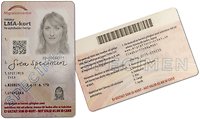Applying for asylum
To apply for asylum, the whole family must come to the Swedish Migration Agency. At the first meeting, the staff will ask you and your family many questions in order to be able to register you in the Swedish Migration Agency's computer system.

Waiting for an asylum investigation
The next step in the asylum process is for you and your family to come to an asylum investigation, a longer interview where you can tell us more about why you want asylum in Sweden. How long you will have to wait for an asylum investigation can be different for different people.
While you wait for a decision, you will be in contact with a reception unit. The staff at the reception unit work, among other things, with determining whether you are entitled to financial support, tell you if you have received a decision, and give you support if the Swedish Migration Agency decides that you are not allowed to stay in Sweden.
If you live in one of the Swedish Migration Agency's apartments, you will also meet the reception unit's accommodation staff. They tell you about rules and provide practical information. With the help of an interpreter, you can tell us what your name is, when you were born and what language you speak. The staff wants to know what your family looks like, how you are doing and if anyone in the family needs special support. If you are afraid of someone or something, it is important that you tell them.
At this first meeting, you will tell us briefly about where you come from, how you have travelled to Sweden and why you need protection in Sweden. You will have more time to talk about it at a later meeting, an asylum investigation. Then you will also have the opportunity to talk to the staff yourself, if you want it and if your parents allow it.
Show who you are
The Swedish Migration Agency wants to know who you are and where you come from in order to make the right decision. It is also important for the Swedish Migration Agency to know how old everyone in the family is, since asylum-seeking children have different rights than asylum-seeking adults.
It is your parents' responsibility to show who you are. The best way to show who you are is by showing a passport or identity card, for example. If your parents cannot show who you are, it will be difficult for the Swedish Migration Agency to assess whether you are entitled to asylum or not.

Photo and fingerprint
You will be photographed, we will measure how tall you are and if you have reached the age of six you will be asked to provide your fingerprints.
Fingerprints are taken by pressing your fingers against a machine that reads your fingerprints. If you are 14 years or older, the Swedish Migration Agency will check if your fingerprints are registered in another country in Europe.
If your fingerprints show that you have already applied for asylum, or have a residence permit, in another country in Europe, the Swedish Migration Agency may decide that you should travel back there. The Swedish Migration Agency may also decide that you should have your application for asylum examined in another country in Europe if you have family members there. Before this is decided, the staff will ask what you and your parents think about it. These rules are called the Dublin Regulation.
 Zoom image
Zoom imageClick on the picture to make it larger.
LMA Card
Once the Swedish Migration Agency has registered your family's application for asylum, you will receive a receipt showing that you have applied for asylum. After a couple of weeks, you can exchange the receipt for an LMA card.
LMA means the Reception of Asylum Seekers Act. An LMA card is a plastic card with a photo of you. It is proof that you are an asylum seeker and that you can stay in Sweden while you wait for a decision. You must bring your LMA card with you every time you visit the Swedish Migration Agency, go to the doctor or pick up medicine at the pharmacy.